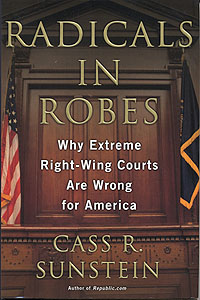Sunstein judges approaches to judging on Supreme Court
By Kim DixonNews Office
 | |
Newly confirmed Supreme Court Chief Justice John Roberts, viewed by Democrats and Republicans as an exceptional legal mind, had meticulously prepared for his Senate Judiciary Committee hearings the week of Monday, Sept. 12.
But Roberts, who won confirmation to succeed William Rehnquist, the former Chief Justice who died of cancer Tuesday, Sept. 6, was caught off guard when Republican Orrin Hatch of Utah asked him about a new book by a Chicago law professor.
HATCH: “And I read an interesting book over the weekend. Cass Sunstein’s recent book (Radicals in Robes: Why Extreme Right-Wing Courts Are Wrong for America) published by Basic Books. Now, he discussed various philosophies with regard to judging. And I just would like to ask you this question: Some of the philosophies he discussed were whether a judge should be an originalist, a strict constructionist, a fundamentalist, perfectionist, a majoritarian or a minimalist—which of these categories do you fit in?”
ROBERTS: “I didn’t have a chance to read Professor Sunstein’s book. He writes a different one every week; it’s hard to keep up with him.”
(LAUGHTER)
Radicals in Robes, written by Sunstein, the Karl N. Llewellyn Distinguished Service Professor in the Law School and the College, hit bookshelves a week before the hearings on Roberts’ nomination began. The 252-page book is aimed at a popular audience and lays out four major areas of legal thinking.
The Economist and the Washington Monthly gave the book favorable reviews, Sunstein wrote editorials in the Wall Street Journal and USA Today and was quoted in papers, including The New York Times and the Chicago Tribune.
In the book, Sunstein explores four different approaches to constitutional interpretation, which, he contends, have organized constitutional thinking throughout American history. He calls these approaches majoritarianism (respect for democratic outcomes unless they are plainly unconstitutional); perfectionalism (associated with the liberal Warren Court); minimalism (“one step at a time”); and fundamentalism.
While sharply critical of perfectionism, he zeros in on the prominence and danger of those in the “fundamentalist” camp, the “right-wing” judges referred to in the book title. These thinkers, according to Sunstein, contend that judges should not depart from the original understanding of those who ratified the Constitution in 1789.
Justice Clarence Thomas and Justice Antonin Scalia fall into this group, he suggests, while Justice Sandra Day O’Connor and Justice Ruth Bader Ginsburg qualify as minimalists.
In an interview on National Public Radio’s Fresh Air program on Wednesday, Sept. 7, Sunstein said the power of fundamentalist judges on the Supreme Court and within the federal court system is “strong and growing.”
And while conservatives accuse liberals of judicial “activism,” the charge of liberal activism applies more to the past. In fact by Sunstein’s count, the Rehnquist Court has struck down more than 30 acts of Congress, making it the most “activist” in history.
In contrast to fundamentalists, “minimalist” thinkers seek to “nudge” the law along, rather than make sweeping “earthquake-like” changes, said Sunstein. They are more likely to tailor opinions in a narrow fashion to specific facts of individual cases, and rely more on precedent, Sunstein said.
This more cautious view is the most sensible approach, Sunstein argues, in that it “makes it possible for people to agree when agreement is necessary and unnecessary for people to agree when agreement is impossible.”
Sunstein places both conservatives and liberals in the minimalist camp, and as he said on Fresh Air, minimalists believe “the Supreme Court is not our national policy-maker,” and they do not think that constitutional law is best made by “traveling in a time machine.”
![[Chronicle]](/images/sidebar_header_oct06.gif)